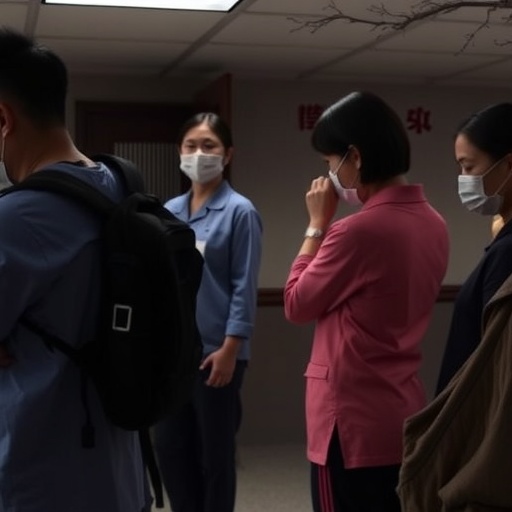The dynamics of workplace relationships can significantly shape the professional environment, particularly in high-stress professions like nursing. Recent research has brought to light a disturbing phenomenon known as “upward bullying,” which refers to aggressive behavior directed by subordinates towards their superiors. This is not merely a challenge of management styles or personality clashes; it represents a fundamental distortion in the hierarchical relationships typically seen in organizations. In a landmark study titled “The prevalence and experience of upward bullying of nurse managers in China: a multicenter mixed methods survey,” a team of researchers, led by Wang et al., delves into this complex issue within the nursing profession in China.
The study is particularly timely, as healthcare workplaces are increasingly recognizing the importance of mental well-being for all staff, including nurse managers who operate under extreme pressure. The researchers conducted a comprehensive multicenter mixed methods survey, which provided a nuanced understanding of the prevalence and impact of upward bullying in nursing. Their efforts illuminate how this toxic behavior undermines not only individual well-being but also overall team efficacy and patient care.
The central findings of this study revealed that a significant percentage of nurse managers have experienced upward bullying at some point in their careers. The researchers note that the experiences of these bullied managers often include verbal aggression, the undermining of professional authority, and social isolation among peers. Such behaviors severely diminish the psychological safety within teams and inevitably affect their capacity to deliver effective healthcare. Despite the hierarchical nature of healthcare settings, these findings challenge entrenched assumptions about power dynamics within the sector.
Methodologically, the study employed a mixed methods design that combined quantitative surveys with qualitative interviews. This dual approach allowed the authors to not only quantify the incidence of upward bullying but also to explore its qualitative dimensions—how it feels to be on the receiving end of such behavior. The quantitative phase involved a structured questionnaire distributed across various hospitals in China to gather statistical data on the prevalence of reported bullying incidents among nurse managers.
The qualitative interviews provided deeper insights into the emotional toll such experiences can take on individuals. Participants described feelings of helplessness, self-doubt, and anxiety, indicating that the effects of upward bullying extend far beyond the workplace. The phenomenon appears to foster a toxic environment that can lead to burnout, high turnover rates, and a decrease in the quality of patient care. Consequently, the implications for healthcare institutions are dire, as the health of the staff directly correlates with the health outcomes of patients.
Another essential aspect of the study was the exploration of the cultural context regarding upward bullying. In Chinese workplaces, traditional views about hierarchy and respect for authority can complicate the acknowledgment and addressing of such negative behaviors. The stigma associated with speaking out may serve as a barrier for nurse managers who might otherwise seek help or report their experiences. The study draws attention to the necessity of creating a culture where all professionals can feel safe and empowered to communicate their concerns without fear of retribution.
The authors argue that addressing the issue of upward bullying requires proactive strategies from healthcare organizations. Comprehensive training programs that focus on conflict resolution, communication skills, and emotional intelligence could equip nurse managers and their teams to better handle interpersonal challenges. These educational initiatives should involve all levels of healthcare staff to foster a supportive culture that discourages bullying and encourages collaborative problem-solving.
Additionally, the need for policies that protect individuals from bullying is paramount. The study advocates for the implementation of clear reporting mechanisms and support systems for those affected by upward bullying. Such measures not only encourage individuals to share their experiences but also help organizations to understand the scope of the issue and take appropriate action against it.
As the nursing profession grapples with mounting challenges—exacerbated by the pressures of the pandemic—attention to the interpersonal dynamics within healthcare settings is more critical than ever. The revelation of upward bullying invites healthcare leaders to reflect on their organizational cultures, recognizing that the psychological well-being of nurse managers is integral to maintaining a healthy work environment for all staff.
By highlighting the prevalence and impact of upward bullying in the nursing field, this study raises alarms about morale and organizational health. The ability of healthcare institutions to address these issues constructively will ultimately determine their capacity to provide patient-centric care in the long run. When professionals feel safe, supported, and respected, they are far more likely to perform at their best, ensuring that patients receive the highest quality of care possible.
In summary, the findings of this study expose a hidden issue within healthcare settings, calling attention to upward bullying as a significant barrier to effective governance and patient care. By embracing the recommendations provided by Wang et al., healthcare organizations can foster a healthier work environment, minimize the detrimental effects of bullying, and promote a culture of kindness and respect that benefits everyone involved—from administrators to patients.
In conclusion, understanding and addressing upward bullying is vital not just for the individual nurse manager but for the entire healthcare system. The study underscores the urgent need for better support mechanisms and a cultural shift in how bullying is perceived and managed within nursing. Only through dedicated efforts can healthcare institutions hope to cultivate a positive environment that encourages leadership, collaboration, and optimal patient outcomes.
Subject of Research: Upward bullying among nurse managers in China.
Article Title: The prevalence and experience of upward bullying of nurse managers in China: a multicenter mixed methods survey.
Article References:
Wang, S., He, J., Cao, Q. et al. The prevalence and experience of upward bullying of nurse managers in China: a multicenter mixed methods survey.
BMC Nurs 24, 1336 (2025). https://doi.org/10.1186/s12912-025-03977-y
Image Credits: AI Generated
DOI: 10.1186/s12912-025-03977-y
Keywords: upward bullying, nurse managers, workplace dynamics, healthcare, China, mixed methods research.




